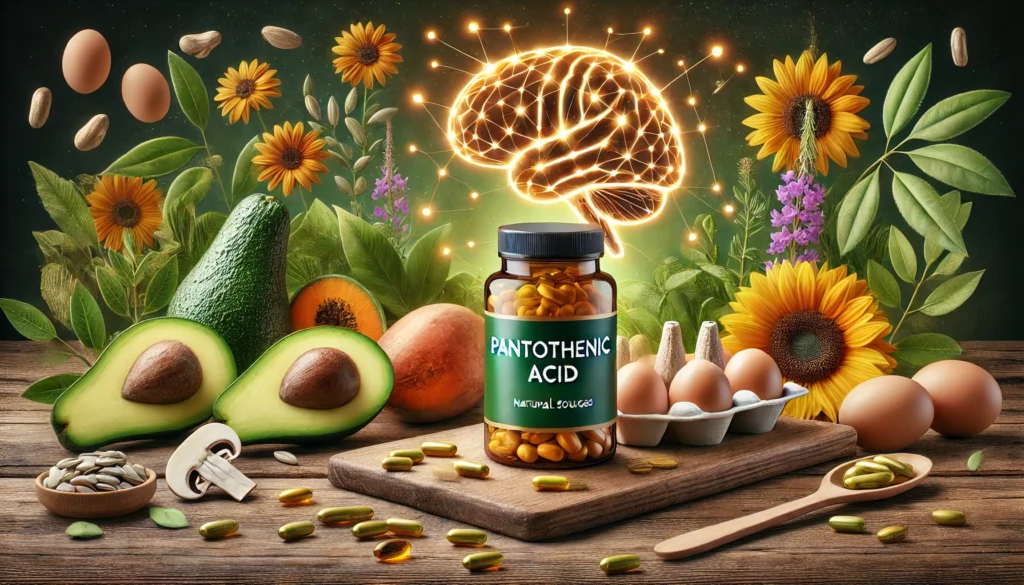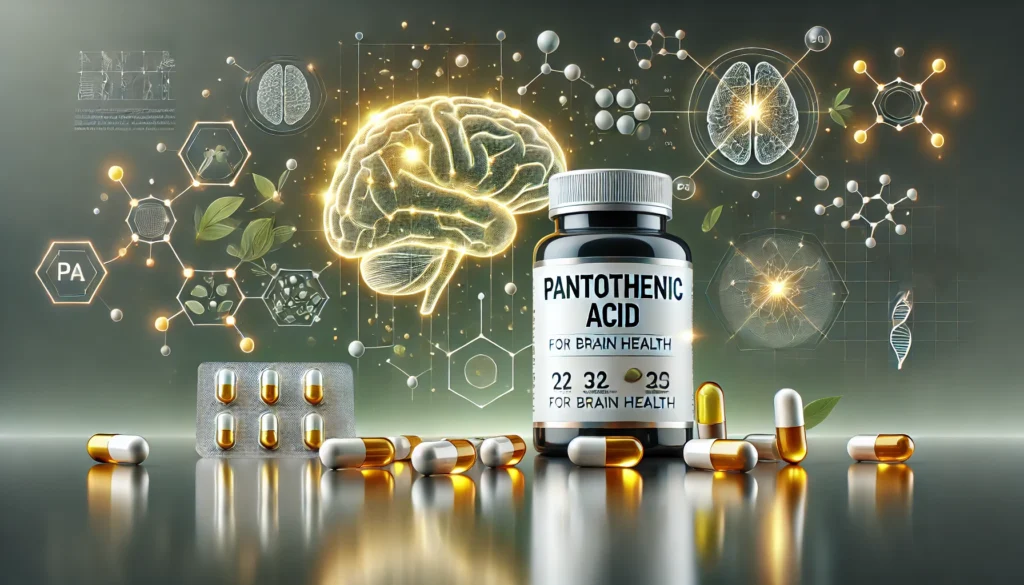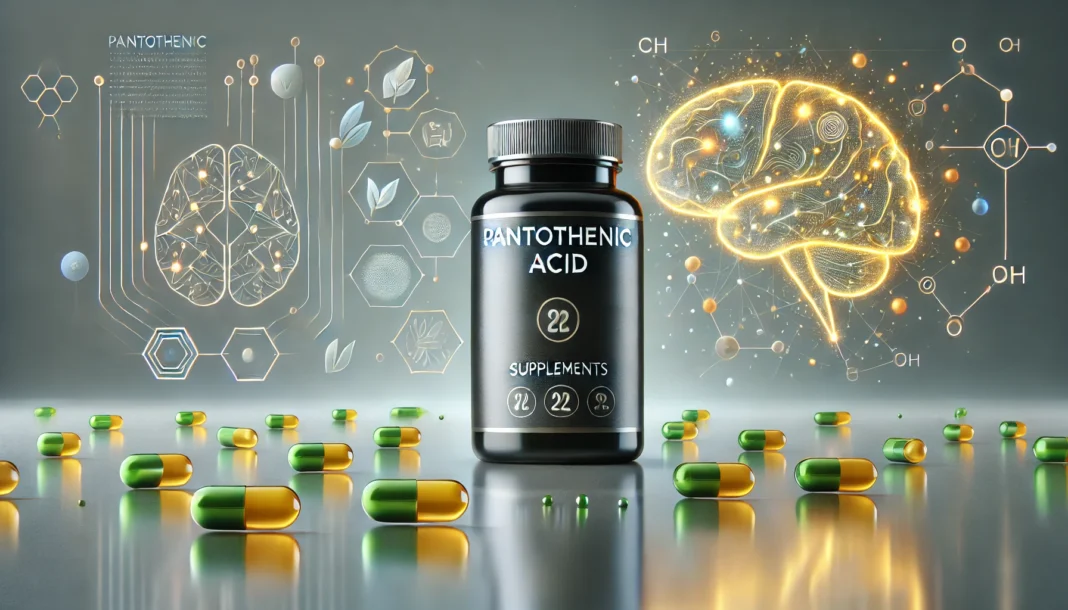Pantothenic acid, also known as vitamin B5, is an essential water-soluble vitamin that plays a pivotal role in numerous biochemical processes critical to human health. As part of the B-vitamin complex, it contributes to energy metabolism, synthesis of coenzyme A (CoA), and the maintenance of healthy skin, hair, eyes, and neurological function. More recently, pantothenic acid has gained attention for its potential nootropic benefits, enhancing cognitive function through its involvement in neurotransmitter production and energy metabolism in the brain. This article provides an in-depth analysis of pantothenic acid, exploring its source, chemistry, physiological mechanisms, potential nootropic benefits, recommended dosage, side effects, drug interactions, and other important considerations for safe supplementation.
You May Also Like:
Vitamin B5 (Pantothenic Acid): Benefits, Dosage, Side Effects, Drug Interactions, And Other Important Information
Sources of Pantothenic Acid
Pantothenic acid is naturally found in a variety of foods, both animal and plant-based. Its name is derived from the Greek word “pantos,” meaning “everywhere,” which reflects its abundance in the food supply. Some of the richest sources include:
- Animal-based foods: Liver, egg yolks, fish (such as salmon and trout), and chicken are excellent sources of pantothenic acid.
- Plant-based foods: Whole grains, avocados, legumes, broccoli, and mushrooms also provide significant amounts of this vitamin.
- Fortified foods: Many processed grains and cereals are fortified with pantothenic acid to ensure adequate intake.
While dietary sources are typically sufficient to meet daily requirements, individuals with increased metabolic demands or dietary restrictions may benefit from supplementation.

Chemistry of Pantothenic Acid
Chemically, pantothenic acid is the amide between pantoic acid and β-alanine. Its active form in the body is Coenzyme A (CoA), a crucial cofactor in numerous metabolic reactions. CoA is required for the synthesis and oxidation of fatty acids, the production of acetylcholine (a key neurotransmitter), and the Krebs cycle, where nutrients are converted into adenosine triphosphate (ATP), the cellular energy currency.
Pantothenic acid’s involvement in CoA synthesis makes it indispensable for energy metabolism. CoA activates acyl groups, which are necessary for the synthesis of fatty acids, phospholipids, and cholesterol—important components of cell membranes and the myelin sheath that insulates neurons. Pantothenic acid also contributes to the production of acyl carrier protein (ACP), an essential component of the fatty acid synthesis pathway.
Physiological Mechanisms of Pantothenic Acid in the Body and Brain
Pantothenic acid exerts its physiological effects primarily through its role in the formation of CoA and ACP. Its involvement in energy metabolism is critical, as the brain is an energy-intensive organ. By facilitating the breakdown of carbohydrates, fats, and proteins, pantothenic acid helps ensure that the brain has a steady supply of ATP, which is essential for maintaining neuronal function, memory formation, and cognitive performance.
In the nervous system, pantothenic acid supports the synthesis of acetylcholine, a neurotransmitter involved in learning, memory, and muscle contraction. Acetylcholine plays a central role in the brain’s cholinergic system, which is vital for cognitive processes such as attention and problem-solving. Given this involvement, pantothenic acid may influence cognitive performance, particularly in individuals with suboptimal levels of the vitamin.

Nootropic Benefits of Pantothenic Acid
While pantothenic acid is not traditionally classified as a nootropic, its role in brain energy metabolism and neurotransmitter synthesis suggests it may have cognitive-enhancing properties. The potential nootropic benefits of pantothenic acid include:
- Enhanced Cognitive Function Through Energy Metabolism: Pantothenic acid’s critical role in ATP production ensures a continuous supply of energy to the brain. Adequate energy is necessary for maintaining mental alertness, focus, and cognitive endurance, particularly during prolonged mental tasks. In times of metabolic stress or fatigue, pantothenic acid may help sustain cognitive function.
- Support for Neurotransmitter Synthesis: Pantothenic acid is necessary for the synthesis of acetylcholine, a neurotransmitter associated with learning, memory, and mood regulation. By supporting acetylcholine production, pantothenic acid may enhance cognitive processes, including memory recall and attention span.
- Mood Regulation and Stress Response: Pantothenic acid is involved in the production of CoA, which participates in the synthesis of cortisol, a stress hormone produced by the adrenal glands. Adequate levels of pantothenic acid could help modulate the body’s stress response and may contribute to mood stabilization, potentially improving mental clarity and reducing feelings of anxiety.
- Potential Neuroprotective Effects: Pantothenic acid’s role in lipid metabolism contributes to the maintenance of cell membrane integrity and the myelin sheath around neurons, which is crucial for efficient nerve signal transmission. These processes may protect against neurodegenerative changes associated with aging and cognitive decline.

Dosage and Supplementation Guidelines
For general health, the recommended daily allowance (RDA) for pantothenic acid is 5 mg per day for adults. However, for nootropic or therapeutic purposes, higher doses may be considered.
- General Nootropic Dosage: Supplementation with pantothenic acid for cognitive enhancement is typically recommended at doses ranging from 10 to 100 mg per day. While clinical studies specifically investigating pantothenic acid as a nootropic are limited, anecdotal reports suggest that higher doses may improve mental focus and reduce cognitive fatigue.
- Supplement Forms: Pantothenic acid is available in various supplement forms, including calcium pantothenate and pantethine. Calcium pantothenate is the most common form found in dietary supplements, while pantethine, a derivative of pantothenic acid, may have additional lipid-lowering benefits. Both forms are well absorbed and utilized by the body.
- Considerations for Specific Populations: Pregnant and breastfeeding women require slightly higher amounts of pantothenic acid (6-7 mg per day), while individuals with high-stress lifestyles or increased energy demands may also benefit from slightly higher intakes.
As pantothenic acid is water-soluble, excess amounts are excreted in urine, reducing the risk of toxicity. However, extremely high doses (in excess of 1,000 mg per day) may lead to gastrointestinal distress, including diarrhea and nausea.
Side Effects and Safety
Pantothenic acid is generally considered safe, even at doses significantly above the RDA. However, some individuals may experience mild side effects when taking very high doses of the supplement. These side effects may include:
- Digestive Disturbances: At very high doses (typically exceeding 1,000 mg per day), pantothenic acid can cause gastrointestinal symptoms such as nausea, diarrhea, and abdominal cramping. These effects are usually temporary and subside when the dosage is reduced.
- Allergic Reactions: Though rare, allergic reactions to pantothenic acid supplements can occur, manifesting as rashes, itching, or swelling. Individuals with known sensitivities should consult a healthcare provider before starting supplementation.
- Potential for Imbalance in B-vitamin Complex: Since pantothenic acid is part of the B-vitamin family, it is generally recommended to take it as part of a B-complex supplement to avoid imbalances in other B vitamins, such as B6 and B12, which could lead to unwanted side effects.

Interactions with Other Supplements and Medications
Pantothenic acid is involved in a variety of biochemical processes, which can lead to interactions with certain medications and supplements. Some interactions to consider include:
- Cholesterol-Lowering Medications: Pantethine, a derivative of pantothenic acid, has been shown to have lipid-lowering properties. Individuals taking cholesterol-lowering medications (e.g., statins) should be cautious about adding pantethine supplements, as the combined effects may lead to excessively low cholesterol levels.
- Oral Contraceptives: Hormonal birth control methods may affect the metabolism of B vitamins, including pantothenic acid. Women taking oral contraceptives may require additional pantothenic acid to maintain optimal levels.
- Antidepressants and Antipsychotics: Certain psychiatric medications, particularly tricyclic antidepressants and antipsychotics, may interfere with pantothenic acid metabolism. In these cases, supplementation may be beneficial to counteract any potential deficiencies.
- Other Nootropic Supplements: Pantothenic acid can be safely combined with other nootropics, such as racetams, caffeine, or L-theanine, to enhance cognitive function. However, individuals combining multiple supplements should monitor their overall intake of B vitamins to avoid overstimulation of energy metabolism.
Risks for Individuals with Certain Health Conditions
While pantothenic acid is safe for most individuals, those with certain health conditions should exercise caution when using this supplement:
- Kidney Disease: Individuals with kidney disease may have difficulty excreting excess pantothenic acid. In severe cases, impaired kidney function could lead to pantothenic acid buildup and exacerbate symptoms.
- Liver Disease: Since pantothenic acid is metabolized in the liver, individuals with liver disease should avoid excessive supplementation. Moderate doses are generally considered safe, but high doses should be taken only under medical supervision.
- Pregnancy and Breastfeeding: Although pantothenic acid is essential during pregnancy and breastfeeding, excessive doses are not recommended due to the lack of safety data on high-dose supplementation in these populations.
Conclusion: Should You Consider Pantothenic Acid as a Nootropic?
Pantothenic acid’s involvement in energy metabolism, neurotransmitter synthesis, and stress response makes it a valuable nutrient for supporting cognitive health. Although it is not widely recognized as a traditional nootropic, its potential to enhance mental clarity, improve focus, and protect against cognitive decline positions it as a promising candidate for those seeking cognitive enhancement through safe, natural means.
As with any supplement, the key to success lies in individualization and moderation. Most people can meet their pantothenic acid needs through a well-balanced diet, but those with higher metabolic demands or cognitive goals may benefit from supplementation. Always consult with a healthcare provider before beginning any new supplement regimen, particularly if you have existing health conditions or take medications that may interact with pantothenic acid.

References:
- Vitamin B5 (Pantothenic Acid). Retrieved from: https://www.ncbi.nlm.nih.gov/books/NBK563233/
- Vitamin B5: An Abundant and Beneficial Part of Your Healthy Diet. Retrieved from: https://health.clevelandclinic.org/vitamin-b5-pantothenic-acid
- Pantethine, a derivative of vitamin B(5) used as a nutritional supplement, favorably alters low-density lipoprotein cholesterol metabolism in low- to moderate-cardiovascular risk North American subjects: a triple-blinded placebo and diet-controlled investigation. Retrieved from: https://pubmed.ncbi.nlm.nih.gov/21925346/
Important Note: The information contained in this article is for general informational purposes only, and should not be construed as health or medical advice, nor is it intended to diagnose, prevent, treat, or cure any disease or health condition. Before embarking on any diet, fitness regimen, or program of nutritional supplementation, it is advisable to consult your healthcare professional in order to determine its safety and probable efficacy in terms of your individual state of health.
Regarding Nutritional Supplements Or Other Non-Prescription Health Products: If any nutritional supplements or other non-prescription health products are mentioned in the foregoing article, any claims or statements made about them have not been evaluated by the U.S. Food and Drug Administration, and such nutritional supplements or other health products are not intended to diagnose, treat, cure, or prevent any disease.



